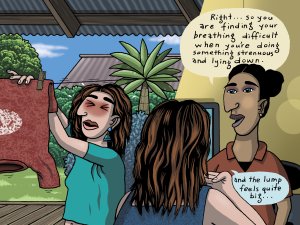Otolaryngologist, head and neck surgeon Francis T. Hall discusses the evaluation of thyroid nodules, which primarily aims to determine the likelihood of malignancy. He then reviews the treatment of thyroid nodules and thyroid cancer, including recent advances in management
Moderna announces MRNA-1345, an investigational respiratory syncytial virus (RSV) vaccine, has met primary efficacy endpoints in Phase 3 trial in older adults
Moderna announces MRNA-1345, an investigational respiratory syncytial virus (RSV) vaccine, has met primary efficacy endpoints in Phase 3 trial in older adults

- mRNA-1345 demonstrated vaccine efficacy of 83.7% against RSV lower respiratory tract disease, defined by 2 or more symptoms in older adults
- mRNA-1345 was generally well-tolerated, with no safety concerns identified by the DSMB
- Based on these results, Moderna intends to submit mRNA-1345 for regulatory approval
CAMBRIDGE, MA, ACCESSWIRE / January 17, 2023 / Moderna, Inc. (Nasdaq:MRNA), a biotechnology company pioneering messenger RNA (mRNA) therapeutics and vaccines, today announced positive topline data from its ConquerRSV Phase 3 pivotal efficacy trial of mRNA-1345, an investigational mRNA vaccine targeting respiratory syncytial virus (RSV) in older adults. Following review by an independent Data and Safety Monitoring Board (DSMB), the primary efficacy endpoints have been met, including vaccine efficacy (VE) of 83.7% (95.88% CI: 66.1%, 92.2%; p<0.0001) against RSV-associated lower respiratory tract disease (RSV-LRTD) as defined by two or more symptoms. Based on these results, Moderna intends to submit for regulatory approval in the first half of 2023.
"Today's results represent an important step forward in preventing lower respiratory disease due to RSV in adults 60 years of age and older. These data are encouraging, and represent the second demonstration of positive phase 3 trial results from our mRNA infectious disease vaccine platform after, Spikevax, our COVID-19 vaccine. We look forward to publishing the full data set and sharing the results at an upcoming infectious disease medical conference," said Stéphane Bancel, Moderna's Chief Executive Officer. "Respiratory diseases are a major public health priority given they have a significant health impact and are a leading cause of hospitalization. For these reasons, in addition to our mRNA-1345 RSV vaccine candidate, we are committed to developing a portfolio of respiratory mRNA vaccines to target the most significant viruses causing respiratory disease, including COVID-19, influenza, and human metapneumovirus."
"RSV significantly affects the health of older and high-risk adults, particularly those with comorbidities," said Abdullah Baqui, a principal investigator for the study sites in Bangladesh and Professor, Department of International Health, Director, International Center for Maternal and Newborn Health, Johns Hopkins Bloomberg School of Public Health, Johns Hopkins University. "This trial will help to understand the role of severe acute respiratory infections in older adult populations and inform the future implementation of vaccines in adults in lower-resource areas."
The ConquerRSV trial is a randomized, double-blind, placebo-controlled study of approximately 37,000 adults 60 years or older in 22 countries, including the US (NCT05127434). The primary efficacy endpoints were based on two definitions of RSV-LRTD defined as either two or more symptoms, or three or more symptoms of disease. The interim analysis was based on 64 cases of RSV-LRTD with two or more symptoms, of which 55 occurred in the placebo group and 9 occurred in the mRNA-1345 group, and 20 cases of RSV-LRTD with three or more symptoms, of which 17 cases were observed in the placebo group compared with three cases observed in the mRNA-1345 group. The other primary efficacy endpoint against RSV-LRTD defined by three or more symptoms was also met, with a VE of 82.4% (96.36% CI: 34.8%, 95.3%; p=0.0078). The trial is ongoing, and additional efficacy analyses are planned as cases accrue, including for severe RSV.
A concurrent review of available safety data was also conducted by the DSMB. mRNA-1345 was well tolerated with no safety concerns identified. Safety and tolerability will continue to be followed in this ongoing study. To date most solicited adverse reactions were mild or moderate and the most commonly reported solicited adverse reactions in the mRNA-1345 group were injection site pain, fatigue, headache, myalgia, and arthralgia. The overall rate of severe (Grade 3 or greater) solicited systemic adverse reactions was 4.0% for mRNA-1345 and 2.8% for placebo. The overall rate of Grade 3 or greater solicited local adverse reactions was 3.2% for mRNA-1345 and 1.7% for placebo. The study is ongoing, and an updated analysis of safety and tolerability will be provided at the time of regulatory submission.
Moderna will submit the data for peer-reviewed publication and present it at an upcoming scientific meeting.




![Barbara Fountain, editor of New Zealand Doctor Rata Aotearoa, and Paul Hutchison, GP and senior medical clinician at Tāmaki Health [Image: Simon Maude]](/sites/default/files/styles/thumbnail_cropped_100/public/2025-03/Barbara%20Fountain%2C%20editor%20of%20New%20Zealand%20Doctor%20Rata%20Aotearoa%2C%20and%20Paul%20Hutchison%2C%20GP%20and%20senior%20medical%20clinician%20at%20T%C4%81maki%20Health%20CR%20Simon%20Maude.jpg?itok=-HbQ1EYA)
![Lori Peters, NP and advanced health improvement practitioner at Mahitahi Hauora, and Jasper Nacilla, NP at The Terrace Medical Centre in Wellington [Image: Simon Maude]](/sites/default/files/styles/thumbnail_cropped_100/public/2025-03/2.%20Lori%20Peters%2C%20NP%20and%20advanced%20HIP%20at%20Mahitahi%20Hauora%2C%20and%20Jasper%20Nacilla%2C%20NP%20at%20The%20Terrace%20Medical%20Centre%20in%20Wellington%20CR%20Simon%20Maude.jpg?itok=sUfbsSF1)
![Ministry of Social Development health and disability coordinator Liz Williams, regional health advisors Mary Mojel and Larah Takarangi, and health and disability coordinators Rebecca Staunton and Myint Than Htut [Image: Simon Maude]](/sites/default/files/styles/thumbnail_cropped_100/public/2025-03/3.%20Ministry%20of%20Social%20Development%27s%20Liz%20Williams%2C%20Mary%20Mojel%2C%20Larah%20Takarangi%2C%20Rebecca%20Staunton%20and%20Myint%20Than%20Htut%20CR%20Simon%20Maude.jpg?itok=9ceOujzC)
![Locum GP Helen Fisher, with Te Kuiti Medical Centre NP Bridget Woodney [Image: Simon Maude]](/sites/default/files/styles/thumbnail_cropped_100/public/2025-03/4.%20Locum%20GP%20Helen%20Fisher%2C%20with%20Te%20Kuiti%20Medical%20Centre%20NP%20Bridget%20Woodney%20CR%20Simon%20Maude.jpg?itok=TJeODetm)
![Ruby Faulkner, GPEP2, with David Small, GPEP3 from The Doctors Greenmeadows in Napier [Image: Simon Maude]](/sites/default/files/styles/thumbnail_cropped_100/public/2025-03/5.%20Ruby%20Faulkner%2C%20GPEP2%2C%20with%20David%20Small%2C%20GPEP3%20from%20The%20Doctors%20Greenmeadows%20in%20Napier%20CR%20Simon%20Maude.jpg?itok=B0u4wsIs)
![Rochelle Langton and Libby Thomas, marketing advisors at the Medical Protection Society [Image: Simon Maude]](/sites/default/files/styles/thumbnail_cropped_100/public/2025-03/6.%20Rochelle%20Langton%20and%20Libby%20Thomas%2C%20marketing%20advisors%20at%20the%20Medical%20Protection%20Society%20CR%20Simon%20Maude.jpg?itok=r52_Cf74)
![Specialist GP Lucy Gibberd, medical advisor at MPS, and Zara Bolam, urgent-care specialist at The Nest Health Centre in Inglewood [Image: Simon Maude]](/sites/default/files/styles/thumbnail_cropped_100/public/2025-03/7.%20Specialist%20GP%20Lucy%20Gibberd%2C%20medical%20advisor%20at%20MPS%2C%20and%20Zara%20Bolam%2C%20urgent-care%20specialist%20at%20The%20Nest%20Health%20Centre%20in%20Inglewood%20CR%20Simon%20Maude.jpg?itok=z8eVoBU3)
![Olivia Blackmore and Trudee Sharp, NPs at Gore Health Centre, and Gaylene Hastie, NP at Queenstown Medical Centre [Image: Simon Maude]](/sites/default/files/styles/thumbnail_cropped_100/public/2025-03/8.%20Olivia%20Blackmore%20and%20Trudee%20Sharp%2C%20NPs%20at%20Gore%20Health%20Centre%2C%20and%20Gaylene%20Hastie%2C%20NP%20at%20Queenstown%20Medical%20Centre%20CR%20Simon%20Maude.jpg?itok=Z6u9d0XH)
![Mary Toloa, specialist GP at Porirua and Union Community Health Service in Wellington, Mara Coler, clinical pharmacist at Tū Ora Compass Health, and Bhavna Mistry, specialist GP at Porirua and Union Community Health Service [Image: Simon Maude]](/sites/default/files/styles/thumbnail_cropped_100/public/2025-03/9.%20Mary%20Toloa%2C%20Porirua%20and%20Union%20Community%20Health%20Service%20in%20Wellington%2C%20Mara%20Coler%2C%20T%C5%AB%20Ora%20Compass%20Health%2C%20and%20Bhavna%20Mistry%2C%20PUCHS%20CR%20Simon%20Maude.jpg?itok=kpChr0cc)